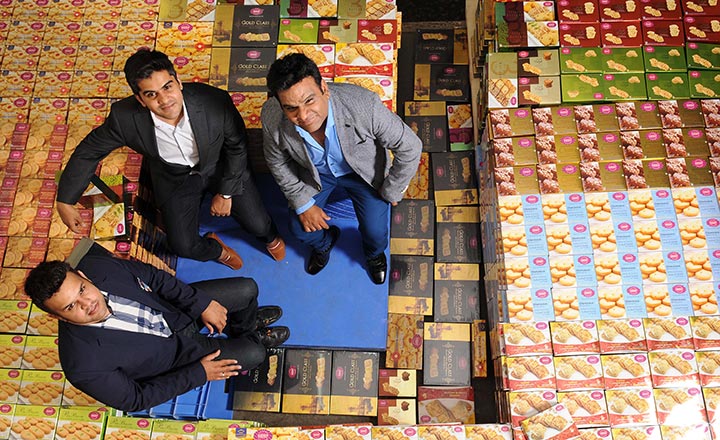The room is engulfed in a warm sweet scent. There is that familiar aroma of melted butter and caramelised sugar that is always a treat for the olfactory sense. A couple of tactful hands are at play kneading the dough while some others sprinkle tiny bits of candied fruit. The massive ovens hum along in the backdrop as if indicating that they are ready to assimilate the prepared mixture. After a seemingly long wait, the doors are opened to reveal the baked goodies. Golden brown with generous portions of a maroon confectionery, the much-in-demand Karachi Bakery fruit biscuits are ready. This and much more is a customary exercise at the 60-year-old baker’s factory unit near Shamshabad in Hyderabad that produces three to four tonnes of biscuits daily. The franchise is fondly known as the ‘True icon of Hyderabad baking’.
As good as new
This bakery enterprise was the creation of Khanchand Ramnani, a native of Karachi in Pakistan, who chose to settle in India after the Partition. At a time when the scarcity of fuel for cooking resulted in deaths due to starvation, Ramnani ventured into the bakery business and he began making rusk and bread with his three sons: Hassaram, Narayandas and Ramesh. In 1953, brothers Narayandas and Hassaram chose to take a bigger leap and diversify the business into biscuits, cakes and pastries. Thus, Karachi Bakery’s first outlet was set up in Moazzam Jahi Market, one of the busiest markets in the city of Charminar.
The bakery today, offers a wide range of products ranging from biscuits, cookies, cakes, cupcakes, macaroons, rusks, sweets, pastries, chocolates, snacks and artisan varieties of bread. It is managed today by the third generation of the Ramnani family — Rajesh, Harish and Vijay Ramnani — who are eager to take forward the legacy of the franchise. “In 1953, we did not have a manufacturing unit; we procured material from other bakeries and sold it. Then, in the 1960s, we started our own small production unit and eventually discovered our signature product (the fruit biscuits),” recalls Rajesh Ramnani, director, Karachi Bakery.
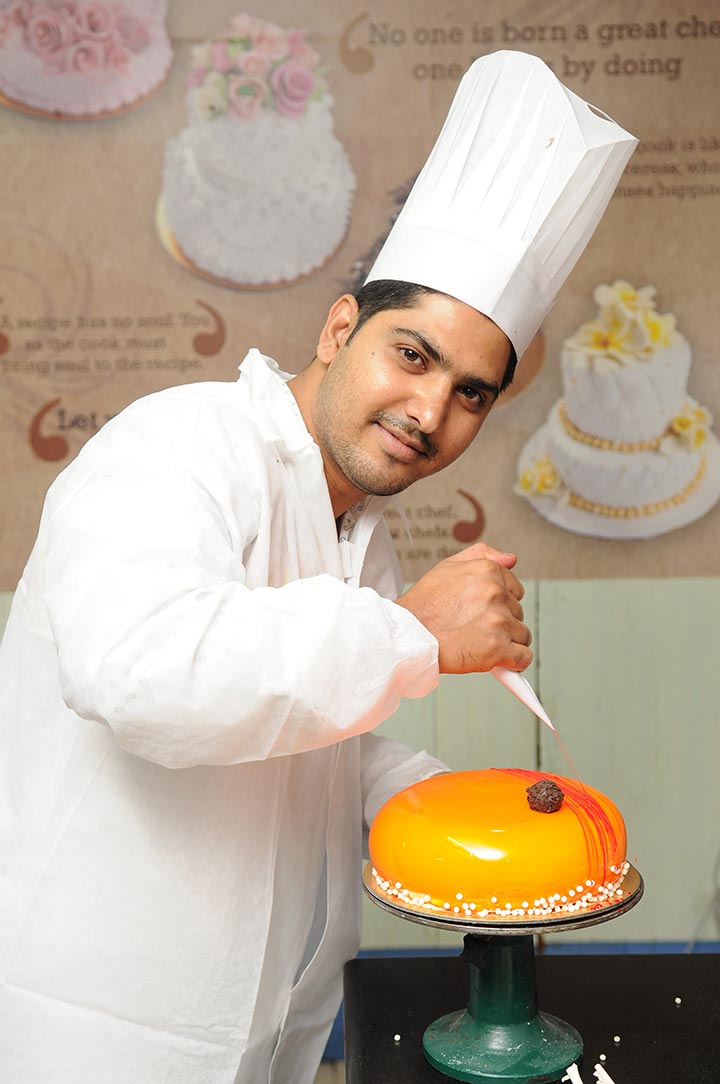
However, defying conventional business beliefs, this little bakery store decided to deliberately go slow when it came to expansion. The trio had bigger aspirations and they wanted to concentrate on improving their limited product base and build a strong regional brand first. And the recipe was indeed delivering expected results as its five-product strong brand in 2006 was gaining popularity not solely for the legacy but also for its quality. Karachi Bakery’s biscuits are hand-made and carry the claim of being fit for consumption for a month. Quality remains a cornerstone of the brand’s policy. Rajesh adds how his grandfather would say, “If you want to do good business, you have to retain the quality at an affordable price and thus expand your consumer base”. Today, its signature products — including the hugely popular fruit biscuit, Osmania, and cashew variants —account for 40% its revenue. The biscuits are priced between Rs. 125 and Rs. 499 for a 400 gm pack.
Once the ingredients for growth were identified and the brand was established, the company shifted focus to profitability. In 2006, Karachi Bakery set up outlets in different parts of Hyderabad — Banjara Hills, Madhavpur, Secunderabad and Gachibowli. “Hyderabad was and is a typically biscuit consuming market. Just how Mumbai is famous for its vada-pav and Kolkata for its fish, Hyderabad, after idlis, is famous for its rusks and biscuits. The Nizami food culture encouraged the creation of rich, dried fruit biscuits from which this market emerged and continues to follow a similar pattern,” explains Harish Ramnani, co-director of the company. In an effort to cater to this demand, Karachi Bakery’s biscuit collection includes butter, choco-cashew, badam-pista, coconut, and chocolate biscotti variants. Today, the stores in Hyderabad attract an average daily footfall of 1,000-1,500 people and registers an average ticket size of Rs. 800.
Spreading evenly
Once the city of Hyderabad was conquered, the bakery chain wan- ted to stake claim to the national market share. The southern brand tied up with marquee retailers such as D-Mart, Big Bazaar and also with a few local retailers across the country. “We launched new flavours and introduced the concept of British, Italian and US cookies in the Indian market,” says Rajesh. And that’s how it added a few more items to its menu namely cream cakes, macaroons, pastries and snacks from 2008. Further on, the company sought to increase its presence in local markets that had an appetite for its products. Karachi Bakery tied up with bulk retailers and distributors in several Indian cities. “We knew that markets such as Kerala are known for cakes and pastries. So, we started supplying more of these products to that market,” explains Vijay.
And this strategy ensured that the regional brand’s products found a spot on the shelves at leading stores across India. Soon after that, Karachi Bakery launched its own stores in metros such as Delhi and Mumbai by 2016. Currently, it has 15 outlets across India and one in Dubai. But what was the game-changer that transformed its business altogether? “We started Karachi Bakery kiosks at Hyderabad’s domestic airport in 2008 and that got us significant visibility. We currently have five kiosks at the domestic and international terminals. So, 50% of our sales are coming from tourists, who take our products to the international market, thus not requiring us to spend heavily on marketing there,” explains Rajesh. Rightly so, the bakery cashed in on its tourist consumer base and began exporting its products to West Asia, US, UK and Australia. “We export four to five containers of biscuits every month, each weighing about eight tonne. This forms about 30% of our revenue. We are growing 10-15% annually with exports,” says a proud Harish.
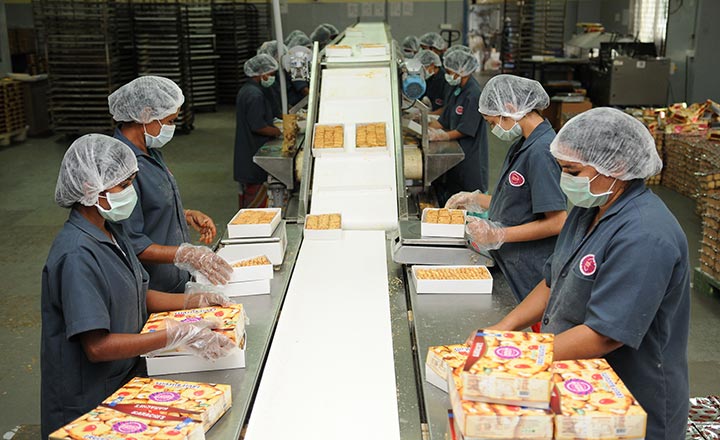
What has worked in favour of the company is its strategy to maintain low production costs. The bakery still carries out the flour preparation, dough-mixing and packaging manually, which helps it keep costs low. Karachi Bakery’s factory currently employs around 350 workers. While other equipment and machinery purchased have been a one-time investment, maintenance and the labour costs are the only variables borne by the company.
Finding the right mix
While Karachi Bakery has earned an enviable reputation in the biscuit market, the brand is trying to replicate the success in its cake and pastry business. It is deploying innovative techniques, while focusing on keeping an affordable price tag. An over 1kg cake is priced as low as Rs. 700 in comparison to Rs.1,500 for the same quantity at a Monginis or a Croissants outlet. Some of their innovations include an almond flour cake, almond opera, Lamington and mille feuille cake, Belgian chocolate, pistachio cakes that use specially sourced ingredients from 15 dealers across India. Moreover, the bakery offers personalised options for cakes and adds 25-30 such orders on a daily basis and 100-150 normal orders from all stores. However, cakes being a perishable commodity, have 25% wastage, which the founders claim is borne by the company.
Apart from cakes, the bakery also produces snacks and savouries to cater to every kind of Indian customer. Its 6,000-sq ft store at Banjara Hills in Hyderabad houses products such as macaroons, rusks, biscuits and cakes. The outlet is converted into a bistro, which serves croissants, rolls, savouries, chocolates, ice creams and snacks.
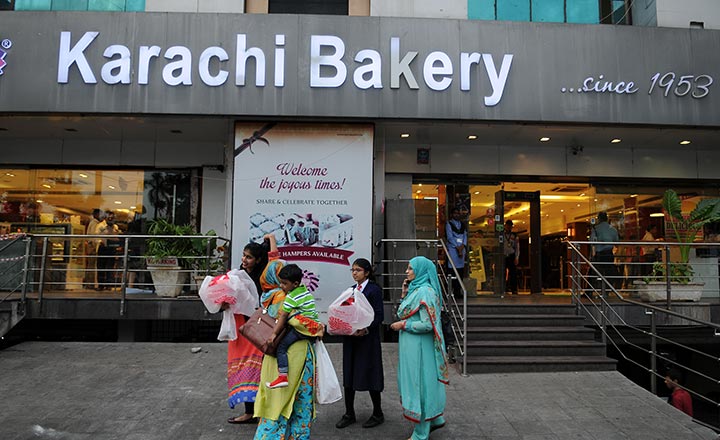
It is during festivals such as Ramadan, Christmas and Diwali that Karachi Bakery finds its cash registers ringing incessantly and its sales doubling. During the festive season, the average footfall in each store ranges from 2,000-2,500 while the average ticket size reaches around Rs.1,200. But to attract more consumers, the bakery has started doling out festive treats, special products that are available for that period only. During Christmas, it’s the special plum cake, almond cake, frosted cookies and ginger bread, ranging between Rs.150 and Rs.600 that do really well. During Ramadan, it’s the dates halwa that sell like hot cakes.
Despite witnessing a surge in demand for its old and new products, the owners are apprehensive about growing in the Indian market. Harish admits that he is wary of the fact that the Indian consumer is becoming more and more health conscious. And how does the bakery ensure that this requirement is taken care of? “We have introduced many varieties of nutritional biscuits for the health-conscious consumer. We have added ingredients like oats, multi-grain, ragi, etc in our biscuits which make them cholesterol-free and healthy,” he says. These range from about Rs.130-150 for a 250-gm pack. The bakery is currently working on introducing organic, flourless and gluten-free products.
What’s in a name?
While one might think that having a legacy would serve well for the future of the brand, turns out it has not always been the case for Karachi Bakery. In October 2015, the Shiv Sena called for a boycott of its products because its name was inspired from a capital city in Pakistan without acknowledging the existence of a famous bakery in the Hyderabad city of present-day Pakistan called Bombay Bakery. So how does the bakery deal with such incidents? “The name is a memory. Our grandfather believed that even after partition, Karachi is a part of India and wanted to instills this thought about undivided India in the minds of others through the brand. In 2016, during Ramadan, the bakery courted controversy again for having allegedly stocked Israeli dates. This hurt the sentiments of a particular community that saw Israel as an oppressor of the Palestine community. The bakery was compelled to stop sales of the product and had to issue a clarification that the dates were being sourced from Iran.
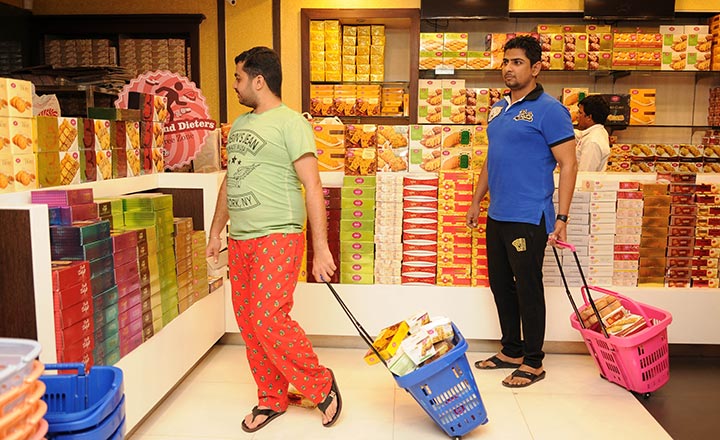
With more and more companies targeting the bakery space, it is difficult for regional brands to correctly capture consumer preferences. Regional brands such as Bangalore Iyengar’s Bakery are gaining a strong foothold in the segment. But Karachi Bakery’s business model has something which its competitors don’t — a strong legacy. With a steadfast determination not to compromise on quality and a promise to serve its consumers only the best of baked goodies, Karachi Bakery is re-visiting its late founder’s dream with renewed vigour.




